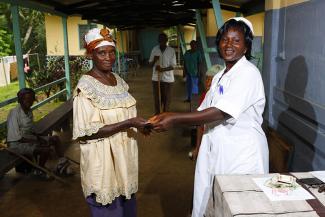Global challenge
Wake-up call to donors
 Heine/Lineair
Heine/Lineair
The study assesses nine developing countries. According to MSF, many sub-Saharan countries have HIV/AIDS infection rates of up to 20 %. The key to preventing the spread of a disease and providing effective therapies is to identify infections fast. In 2017, there were about 10 million new TB patients, MSF reports, 9 % of whom were HIV-positive. In more than 500,000 cases, they suffered from antibiotic-resistant strains.
MSF warns that funding for HIV/AIDS and TV programmes has fallen behind the need. In 2016, it was determined in the context of the WHO (World Health Organization) that an annual $ 26 billion at least would be needed until 2020. In 2018, however, only $ 19 billion were made available, and that was $ 1 billion less than in 2017.
The two most important donor institutions in the fight against HIV/AIDS and TB are the Global Fund and PEPFAR. The Global Fund relies on public and private funding; it was established to fight the two diseases as well as malaria. PEPFAR (President´s Emergency Plan For Aids Relief) is a US initiative. According to the MSF publication, both have reduced their spending.
As MSF reports, both institutions want recipient countries to increase their health spending, including for procuring medication and paying staff. However, MSF reckons that annual investments worth $ 370 billion are needed to provide universal healthcare internationally. The authors insist that countries with weak economies and low tax revenues are overburdened already.
Moreover, some countries – including the Central African Republic or the Democratic Republic of the Congo, for example – are said to be struggling with multiple humanitarian, geopolitical and economic challenges. They include:
- refugees spreading diseases,
- failed harvests due to droughts or flooding and
- corruption.
Less international funding for health programmes is likely to undermine the progress made in the fight against HIV/AIDS and TB, the MSF publication argues. For example, the treatment of individual TB patients may be interrupted or discontinued entirely, which makes the emergence of drug-resistant strains more probable. Another downside is that people’s faith in doctors and professional healthcare is being eroded.
In some countries, infection ratios are rising again, according to MSF. The agency warns that the international community is far from getting a grip on the two diseases. It appreciates success in some countries, but points out that they do not suffice and that things are worse in other places. Among other things, the MSF experts demand that
- TB treatment must always continue and not fall behind contemporary standards,
- some emergency funding must be established to avoid bottlenecks, and
- the grassroots initiatives of local communities must get more support.
MSF wants the World Bank and other donor institutions to establish new funding instruments and improve conditions, so private-sector companies will invest in public health. They could, for instance, build and run hospitals. Governments of developing countries should be put in charge of oversight and guarantee that funds are used prudently. The publication also suggests that relevant agencies should draft strategies of their own.
The humanitarian organisation does not oppose the shift from international to national funding as a matter of principle. Its point is that the impacts of that shift must be controlled so neither the quality of health-care systems nor the quantity of their services will suffer. MSF wants international donors, including the Global Fund and PEPFAR, to support developing countries in ways that prevent avoidable medical hardships.
Link
Médecins Sans Frontières, 2019: Burden sharing or burden shifting? How the HIV/TB response is being derailed.
https://www.msf.org/burden-sharing-or-burden-shifting
Florian Gaisrucker was an intern at D+C/E+Z in the 4th quarter of 2019.
euz.editor@dandc.eu

